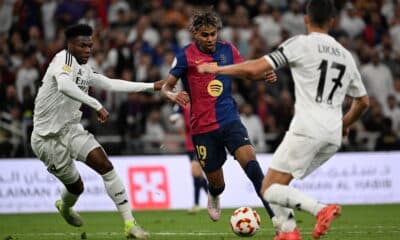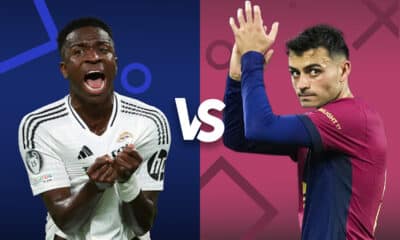
On July 3, 2019, Atlético Madrid completed the signing of João Félix on a seven-year contract, paying a club record €126 million, the fourth-highest transfer fee in football history, for the 19-year-old Portuguese forward. The announcement came 10 months and 16 days after Félix made his first-team debut for Benfica and nine days before Atlético sold Antoine Griezmann to Barcelona for €120 million.
The Early Days
Although Félix had been promoted to the first team the previous summer under Rui Vitória and became the youngest player to ever score in a Lisbon derby in a 1-1 draw with Sporting on August 25, he had only played 369 minutes of senior football (163 in Liga NOS) before Bruno Lage was appointed Benfica manager on January 3. The teenager quickly became a full-fledged starter in Lage’s 4-4-2, starting alongside Swiss international Haris Seferović and registering 20 goals and 11 assists as Benfica climbed from fourth in the Primeira Liga to win their fifth league title in six years.
With just four months of consistent starts at the senior level, Félix landed at the Wanda Metropolitano with the explicit mission of replacing Griezmann, a World Cup winner who had provided 133 goals and 50 assists since joining from Real Sociedad in 2014. More than that, he arrived to spearhead a new-look, fresh-faced Atlético side that had lost veteran leaders such as Diego Godín, Juanfran and Filipe Luís as well as key first-team members in Rodri and Lucas Hernandez.
The Initial Struggle At Atletico
His debut came on August 19 against Getafe, and it didn’t take him long to make an impact. Receiving the ball deep in his own half, he nutmegged Mauro Arambarri, slithered past Fayçal Fajr, and dribbled into the box before being felled by Bruno González. Álvaro Morata would miss the penalty that would have made it 2-0, but that singular play was the kind of individual magic that suggested Félix wasn’t merely a good prospect, but one of the best talents of his generation.
For one reason or another, Félix struggled to maintain that level of performances over his first season in Spain. He suffered an ankle injury on October 19 following a rash tackle by Valencia captain Dani Parejo, leaving the Portuguese forward sidelined for one month, and in January, he was relegated to the treatment table after suffering a leg injury in a stalemate against Leganés. Moreover, as Diego Simeone was attempting to reinvent his traditional 4-4-2 in the wake of the aforementioned departures, with his fullbacks pushing further up the pitch than usual and his team dominating possession rather than seeking to hit on the counter, ‘Cholo’ struggled to find a consistent role for his record signing, sometimes playing him on the right-wing, other times as a second striker, other times on the bench.
Whilst Félix’s technical brilliance was enough to dazzle the average spectator, his lack of physical stamina and endurance led to criticism from Simeone, who had grown accustomed to Griezmann pressing like a hungry dog until the final whistle.
“João is the best we have offensively, he creates danger whenever the ball is at his feet,” said Simeone after a 2-0 victory against Osasuna on December 19.
“I would like João to have a little more fuel at the end of the game, maybe we have to make him run less.”
Things Get Better
Félix entered the Coronavirus-enforced break following a truncated season that had seen him win the Golden Boy Award, nominated for the Ballon D’Or, and included in MARCA’s most disappointing transfers of the La Liga season along with Eden Hazard, Frenkie de Jong and Griezmann. He returned to action on June 17 in the return fixture against Osasuna in which he opened the scoring with a thunderous effort into the top right corner, before doubling his tally in the 56th minute.
He failed to replicate that level of performance during the final weeks of the La Liga season, and when Atlético faced off against RB Leipzig in the Champions League Quarterfinal, he found himself on the bench. After falling behind to Leipzig via a headed goal from Dani Olmo, Simeone subbed Félix on for Héctor Herrera; within minutes, he conjured up the same magic we saw on opening day against Getafe. He wriggled past Marcel Sabitzer, cut inside and played an audacious one-two with Ángel Correa, exploited a channel of space between Lukas Klostermann and Dayot Upamecano before being fouled in the area by Klostermann. This time, Félix took the penalty and slotted it into the left corner past Péter Gulácsi.
Leipzig would break the deadlock in the 88th minute via a deflected goal from Tyler Adams, sealing progression to the semifinals in Lisbon, but Félix has ridden the momentum from that singular moment and emerged as the protagonist in attack for Simeone’s men this season. In the opening fixture of the La Liga season, he provided a goal, an assist, and won a penalty in a 6-1 thrashing of Granada.
Key Player On Attack
Despite failing to provide a single goal or assist in the following month, Félix has taken on a new role of protagonist in attack for Atlético Madrid, who currently sit behind Real Sociedad and Villarreal in the title race whilst having two games in hand. The Portuguese youngster has formed a dynamic duo in attack with Luis Suárez, who joined Atleti on a free transfer this summer after being released by Barcelona. In the past few weeks, Félix has begun to combine his technical brilliance and speed of mind with a consistent final product in front of goal.
When Atlético faced off against Red Bull Salzburg on October 27, Félix produced a masterclass worthy of his €126 million price tag. He created danger early on in the 13th minute, sneaking past André Ramalho and attempting an audacious bicycle kick, but his shot careened off the crossbar. Playing in a withdrawn role on the left flank, Félix showcased first-class movement on and off the ball, creating goal-scoring occasions for himself with slick one-twos, winning fouls at the edge of the box with his elusive change of direction, and scoring a brace to lead Atleti to a 3-2 victory in Madrid.
Félix continued his impressive form the following weekend against Osasuna, converting from the penalty spot before halftime before exploiting Unai García’s blind side and firing the second goal past Sergio Herrera in goal. Moreover, he proved capable of leading the line without the 33-year-old Pistolero by his side and created plenty of danger alongside Ángel Correa and Marcos Llorente.
Conclusion
After a difficult first season in Spain, it seems that Simeone’s system is adapting itself to meet the needs of its Portuguese wunderkind, and vice versa. We’re not simply seeing the Félix whose individual magic alone is worth the price of entry; we’re seeing a player who holds no qualms about tracking back to keep his team compact against the counter, a player who’s capable of pressing high up the pitch even in the 89th minute.
Before joining up with his Seleção teammates in Portugal for the November international break, Félix delivered arguably the finest performance of his Atleti career so far against newly-promoted Cádiz. Félix broke the deadlock in the 8th minute, deftly heading a cross past goalkeeper Jeremias Ledesma and into the back of the net.
The Portuguese forward helped seal the victory shortly after halftime; deftly positioned in between the two strikers (Llorente and Suárez), he collected a loose ball and played an inch-perfect through ball towards Suárez, who barely remained onsides and slotted the third goal past Ledesma. The cherry on top came in the 90th minute; Félix controlled a pass from Correa on his chest before slamming home the volley.
Barring a major injury, Félix will not only be starting for Portugal in next summer’s European Championships; he’ll be playing a titular role as the chief playmaker. At 21 years of age, he is no longer the star of the future, but the present as well.
























